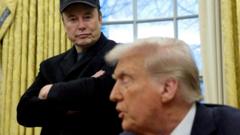This move, which could complicate ongoing trade discussions, raises alarms about potential economic repercussions on both sides of the Atlantic.
**EU Expresses Serious Concern Over US Steel Tariff Hike**

**EU Expresses Serious Concern Over US Steel Tariff Hike**
The European Union has conveyed its strong opposition to the US government's announcement to significantly increase steel and aluminium tariffs.
The European Union has officially voiced its grave concerns regarding US President Donald Trump's unexpected decision to elevate tariffs on steel and aluminium imports from 25% to 50%. This radical increase, announced during a rally in Pittsburgh, has stirred fears regarding the stability of ongoing bilateral trade negotiations and could lead to chaotic consequences in international commerce.
The EU's executive body, the European Commission, expressed disappointment over the measures, emphasizing that this action erodes current negotiations and may invite retaliatory responses. "We strongly regret the announced increase," the Commission stated, warning that this tariff hike leads to greater uncertainty, raising costs for businesses and consumers alike.
At the same time, the UK's recent trade accord with the US is now under scrutiny, as discussions regarding its implications are underway with American officials. A spokesperson for the UK government confirmed that they are seeking clarification on how this tariff change could affect their zero-tariff agreement on steel and aluminium, which remains unsigned despite being reached earlier this month.
Trump has positioned this tariff increase as a strategy to support the ailing US steel industry and diminish imports from countries like China. He further cited a $14 billion investment partnership aimed at revitalizing steel production in the US, although specifics about the deal are still pending.
The announcement arrives amid questions over the legality of Trump’s broader tariff strategy, which has faced legal challenges but remains largely intact at this stage. In a fleeting moment of optimism, Trump indicated a desire to extend negotiations with the EU to prevent worsening the already strained trade relationship.
As the domestic steel industry continues to struggle, the balance of global production has increasingly tilted towards countries such as China, India, and Japan. The American market relies on imports for about a quarter of its steel demand, raising stakes for both the US and its international trading partners as this situation unfolds.
The EU's executive body, the European Commission, expressed disappointment over the measures, emphasizing that this action erodes current negotiations and may invite retaliatory responses. "We strongly regret the announced increase," the Commission stated, warning that this tariff hike leads to greater uncertainty, raising costs for businesses and consumers alike.
At the same time, the UK's recent trade accord with the US is now under scrutiny, as discussions regarding its implications are underway with American officials. A spokesperson for the UK government confirmed that they are seeking clarification on how this tariff change could affect their zero-tariff agreement on steel and aluminium, which remains unsigned despite being reached earlier this month.
Trump has positioned this tariff increase as a strategy to support the ailing US steel industry and diminish imports from countries like China. He further cited a $14 billion investment partnership aimed at revitalizing steel production in the US, although specifics about the deal are still pending.
The announcement arrives amid questions over the legality of Trump’s broader tariff strategy, which has faced legal challenges but remains largely intact at this stage. In a fleeting moment of optimism, Trump indicated a desire to extend negotiations with the EU to prevent worsening the already strained trade relationship.
As the domestic steel industry continues to struggle, the balance of global production has increasingly tilted towards countries such as China, India, and Japan. The American market relies on imports for about a quarter of its steel demand, raising stakes for both the US and its international trading partners as this situation unfolds.




















